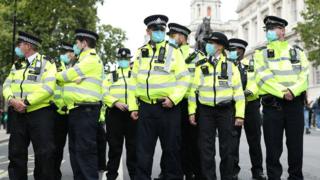 Image copyright
PA Media
Image copyright
PA Media
A survey of more than 40,000 police officers in England and Wales found that almost four in ten said they had been assaulted in the last year.
The research by the National Police Chiefs Council (NPCC) also found 88% of officers said they had been assaulted during their career.
Three-quarters of police officers said they wanted to carry Taser stun guns every day.
But police chiefs are investigating racial disparities in Taser use.
NPCC chairman Martin Hewitt said he was shocked by the scale of the assaults and that a third of officers said they were unhappy with the personal safety training they received.
Police chiefs are calling for a new offence of targeting police officers with a vehicle, as well as for spitting and hate crimes to be considered as aggravating factors when suspects are brought to court.
Coughing and spitting incidents during the pandemic, protests and illegal raves have driven a rise in attacks in recent months, with provisional data showing attacks up 24% year-on-year in the four weeks to 7 June.
In 2018-19, there were 31,000 assaults on officers - equivalent to 328 assaults per 1,000 constables, up from 284 per 1,000 the previous year.
Che Donald, vice-chairman of the Police Federation of England and Wales, said officers and the majority of the public were "appalled by the atrocious levels of violence colleagues have faced recently" and police chiefs must take "swift action".
The report found that 87% believed all frontline officers should have the option to deploy with Tasers. Three-quarters of police officers said that they personally wanted to carry a Taser.
Kent Chief Constable Alan Pughsley, the NPCC lead on officer safety, said that Tasers are "fallible" and officers should not be "over-reliant" on them.
Almost all officers said they thought Tasers were "very effective" or "fairly effective" but research into the use of the weapons found that although drawing a Taser may act as a deterrent, assaults and injuries were no more or less likely when they were carried.
Figures show Tasers and other "less lethal" weapons are more likely to be used against black people, and the NPCC is commissioning research to find out why.
The NPCC report also said:
- More than two in five police officers killed between 2008 and 2019 died while travelling to and from work. Police chiefs are researching links between shift work and road accidents
- Every chief constable will review whether frontline officers and staff have enough Tasers, body armour, spit and bite guards, protective gloves and high-visibility clothing
- Trials of new technology and equipment to prevent assaults will be speeded up, including changes in police vehicles and remotely operated devices to immobilise vehicles
- A "hard-line" approach will be taken into investigations of assaults against officers, with the default position that the alleged offender will be arrested